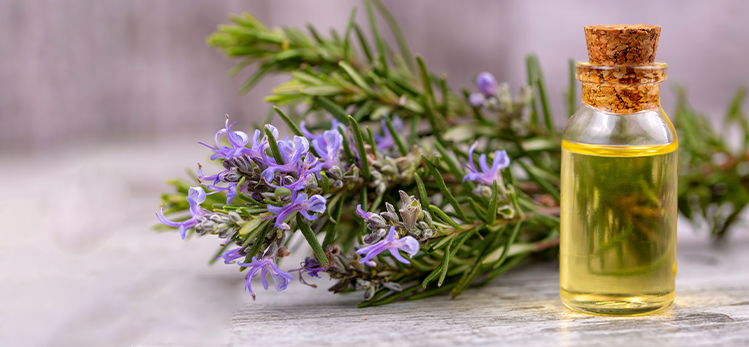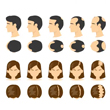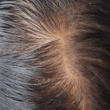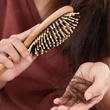Few Tips For Hair Growth
What can be more debilitating than seeing hundreds of hair strands shedding from your scalp every time you brush your hair? Also, excessive molting occurs during seasonal changes that can be very stressful for you. Although it’s okay to lose between 50-100 strands every day, according to the American Academy of Dermatology, the problem occurs when you start shedding more than normal. But that doesn’t mean you have to feel helpless as there are ways to grow your hair back. Even if you are coping with baldness or alopecia, certain hair growth tips from dermatologists can come to your rescue. Read on to discover how these tips can be your savior when abnormal hair fall problems are in sight.

Natural Ways to Grow Hair
According to dermatologists, boosting hair growth and preventing hair fall is possible by:
1. Eating Nutrient-Rich Diet
It is a well-known fact that certain nutritional deficiencies can orchestrate hair loss. Case in point: iron deficiency which is common in women during perimenopause and menopause. To counteract the condition, it’s crucial to rely on iron-rich foods. Besides this, your hair also needs fatty acids, zinc, vitamins, selenium, biotin, and protein for optimal growth. However, make sure not to overdo it when it comes to taking supplements, as excessive supplementation can be counterproductive.
2. Doing Regular Hair Massages
The reason to do scalp massages is a no-brainer. Regular hair massages are bound to increase blood flow to the scalp area and expedite new hair growth. A Japanese study conducted on men showed that routine scalp massages improve hair thickness significantly.
3. Practicing Healthy Lifestyle
Apart from relying on a hair-friendly diet and engaging in regular scalp sessions, you need to make some other lifestyle changes to amass healthy hair strands. Incorporate these hair care and hair growth tips in your everyday lifestyle for the best results:

Do not wash your scalp and hair too often. Always condition before and after washing your hair. It’s good to use a toxin-free shampoo every time.
Never mess with wet hair. Allow the hair to dry naturally instead of using blow dryers.
Exercise and meditate to de-stress and reduce stress-induced hair loss.
Limit the use of chemical treatments and hair styling tools.
Get regular trims to fix damaged hair.
Keep your hydration levels in check. Limit alcohol intake as it dehydrates the hair.
Take proper rest at night and avoid binge-watching.
Some Pharmacological Treatment options for Hair Growth(to be taken only after Dermatologist’s assessment)
In certain cases involving alopecia and other hair disorders, dermatology-grade treatments become paramount. Depending on your condition, your dermatologist may prescribe one of the following treatments.
Minoxidil
Minoxidil is a prescribed medication used to treat androgenetic alopecia . It is available in a 2% and 5% solution. This treatment should be undertaken only as per the instructions of your dermatologist and should be consistently adhered to for three to four months for visible results.
Finasteride
Finasteride is another drug to remedy hair loss and trigger regrowth associated with male pattern hair loss. It works by inhibiting the production of dihydrotestosterone (DHT) that damages the hair follicle. A clinical trial proved the efficacy of this drug when tested on a group of men. At the end of the trial, it was concluded that finasteride treatment significantly increases hair count, slows down hair loss, and also improves the appearance of hair. Just like Minoxidil , consult your dermatologist before opting for this treatment as some side effects are associated with it.
Home Remedies for Hair Growth
Certain DIY remedies involving pantry ingredients can help fight against hair loss. They include:

1. Rosemary + Coconut Oil
Rosemary is said to boost hair growth faster than many hair loss treatments. Plus, it’s natural and safe. Combine rosemary essential oil with coconut oil and use the blend to massage your scalp.
The Takeaway
Less hair on the scalp can impact your self-esteem negatively and can even be embarrassing. Luckily, some natural hair growth tips, in conjunction with safe and tested dermatology-grade treatments, can tackle all your hair care concerns.
Maintaining a healthy and stress-free lifestyle and nutritious meals are very important for optimal hair care. Visit your dermatologist for any hair fall related complains to get optimal diagnosis and management plan.
Myth Busters HairFall

Androgenetic Alopecia - Everything You Need To Know
Have you been experiencing excessive hair fall over a prolonged period of time? It could be an early sign of androgenetic alopecia. It is a hair loss disorder common in both genders and can lead to progressive thinning and even baldness in some patients if not caught and treated early.

How To Make Hair Grow Faster For Men
A head full of healthy hair is a matter of confidence. Hair has its own mechanism of growing and shedding, and it is when this mechanism is thrown off that growth is hindered. Especially in the case of males, hair growth faces a lot of hiccups that can easily be managed.

Female Pattern Baldness - Causes & Treatments
Have you suddenly noticed an increase in the number of hair strands on your pillow in the morning? Or is your ponytail getting thinner by day? Well, you might be suffering from female pattern baldness. While that does sound scary, identifying it early on is key to treating this condition effectively. So keep reading to know what this is, how you can identify it, and most importantly, what treatments you can avail of to get your beautiful lustrous hair back.

What Are The Reasons For Hairfall?
Almost everyone experiences some amount of hair thinning over the years. Shedding around 50 to 100 single strands of hair per day is considered normal. However, losing more than 150 strands a day, experiencing sudden thinning, or developing circular bald patches on your scalp are reasons for concern. Hair loss occurs when new hair doesn’t grow fast enough to replace the amount of hair you lose daily. Hair can fall due to various reasons, with hereditary hair loss and poor nutrition being the most common hair fall reasons.

Expert Approved Tips For Hair Growth
What can be more debilitating than seeing hundreds of hair strands shedding from your scalp every time you brush your hair? Also, excessive molting occurs during seasonal changes that can be very stressful for you. Although it’s okay to lose between 50-100 strands every day, according to the American Academy of Dermatology, the problem occurs when you start shedding more than normal. But that doesn’t mean you have to feel helpless as there are ways to grow your hair back. Even if you are coping with baldness or alopecia, certain hair growth tips from dermatologists can come to your rescue. Read on to discover how these tips can be your savior when abnormal hair fall problems are in sight.
Trending Videos
+ 8 Sources
LMRC - GGI-CO-A2-DMA-300026126-300026126-WM-J21-413
© 2021 Dr. Reddy’s Laboratories Ltd. All rights reserved.